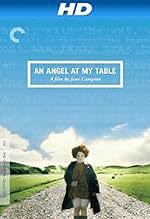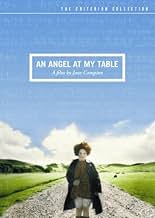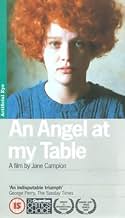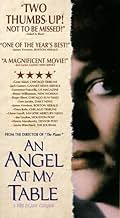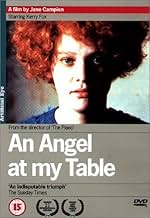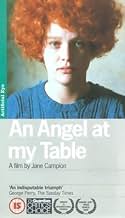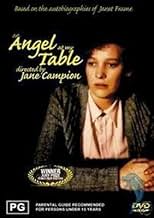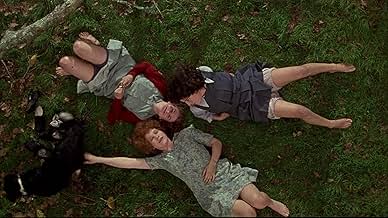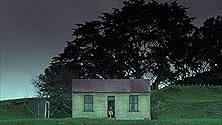ÉVALUATION IMDb
7,4/10
9,2 k
MA NOTE
Janet Frame était une enfant brillante qui, à l'adolescence, avait été diagnostiquée à tort avec la schizophrénie. L'histoire de la découverte du monde par Janet et sa vie en Europe alors qu... Tout lireJanet Frame était une enfant brillante qui, à l'adolescence, avait été diagnostiquée à tort avec la schizophrénie. L'histoire de la découverte du monde par Janet et sa vie en Europe alors que ses livres sont publiés avec succès.Janet Frame était une enfant brillante qui, à l'adolescence, avait été diagnostiquée à tort avec la schizophrénie. L'histoire de la découverte du monde par Janet et sa vie en Europe alors que ses livres sont publiés avec succès.
- Prix
- 19 victoires et 5 nominations au total
Kevin J. Wilson
- Father
- (as K.J. Wilson)
Avis en vedette
In the ambitious follow-up to her celebrated debut feature 'Sweetie' Jane Campion presents yet another social misfit at odds with an unsympathetic world, drawing her inspiration this time from the autobiography of Janet Frame, a New Zealand writer who suffered eight years of electro-shock therapy after being misdiagnosed for schizophrenia. The film is structured in the form of a triptych, with the best moments (perhaps not surprisingly) all clustered in the first episode, showing the young Frame's childhood in a poor but literate household, always at the mercy of adult authority: teachers, doctors, and so forth. These early scenes aren't exactly meant to set a cheerful mood, but they look positively giddy compared to the rest of the film, the length of which eventually overwhelms its subject: watching the drab and lonely life of a painfully shy, pathetically insecure, repressed and introverted writer unfold over 158 minutes can be an oppressive experience. Campion's unique visual style is never less than interesting, but her technique of using sudden blackouts to separate short, seemingly unrelated fragments of narrative memory only underscores the difficulty of capturing on film the creative process of a writer.
I think this film is another fine example of Kiwi talent! Some incredibly original literature, film, television, and acting talent originates from the island nation of New Zealand. "An Angel At My Table" is one of the great examples. The first time I saw this film (or tele-film) I was left emotionally affected by Janet Frame's life. I could not believe how easy it was for someone to be treated the way she was just because she was shy, socially awkward and had curly, red hair. How times have changed! Nowadays if you are not a freak ... you are a freak! It is scary to think how easy it was, apparently at that time, for a person to be thrown into a madhouse. Not to mention the deplorable conditions of those types of institutions.
Initially, I felt sorry for Ms. Frame but then I realized she probably has had a fuller life than I have had (or probably ever will). She has accomplished so much and given pleasure to the many who have read her stories and poetry. Watching this film has prompted me to begin looking for her writings since I have been so intrigued by her story. I was glad to see that by the end of the movie she had begun to become comfortable with herself and open her shell. Biographical information on Ms. Frame seems sketchy. I have not found much information about her life after the period where the film ended.
Thank you Jane Campion for another wonderful character driven film (albeit a real-life character this time)! The only real criticism I have of the film is the portrayal of Frame's time in the institution. While the film did not make it pretty nor gloss over the situation in general, sources I have read indicate Janet was dangerously close to receiving an operation that seems similar to a lobotomy. The operation, if performed, would have left Janet an emotionless, child-like creature and was not adequately depicted. But for the grace of her publication, she was saved.
Initially, I felt sorry for Ms. Frame but then I realized she probably has had a fuller life than I have had (or probably ever will). She has accomplished so much and given pleasure to the many who have read her stories and poetry. Watching this film has prompted me to begin looking for her writings since I have been so intrigued by her story. I was glad to see that by the end of the movie she had begun to become comfortable with herself and open her shell. Biographical information on Ms. Frame seems sketchy. I have not found much information about her life after the period where the film ended.
Thank you Jane Campion for another wonderful character driven film (albeit a real-life character this time)! The only real criticism I have of the film is the portrayal of Frame's time in the institution. While the film did not make it pretty nor gloss over the situation in general, sources I have read indicate Janet was dangerously close to receiving an operation that seems similar to a lobotomy. The operation, if performed, would have left Janet an emotionless, child-like creature and was not adequately depicted. But for the grace of her publication, she was saved.
What do these people have in common: Lou Reed, Vivien Leigh, Yves Saint Laurent, and Janet Frame? Answer: They were all given electroconvulsive shock therapy for highly questionable reasons, and suffered because of it.
Going in to this film I'd never read anything by New Zealand author Janet Frame, but nevertheless found the story of her life to be interesting. She's a compelling figure because of how awkward she was, clearly intelligent and talented but also riddled with social anxiety. It's very well cast, with the transitions between three actresses at differing portions of her life from child to adult being seamless, and all giving good performances.
I didn't give the film a higher rating because despite coming in at 238 minutes spread out over three parts, it left me with questions about aspects of her life and somehow lacked detail in places it shouldn't have, and was probably too long in others. Transitions were often on the abrupt side, and there seemed to be a certain softening of things. Maybe that's how life is when told with a backward glance over decades though, I don't know. Anyway, it's a pretty good film, and one with an uplifting spirit to it.
Going in to this film I'd never read anything by New Zealand author Janet Frame, but nevertheless found the story of her life to be interesting. She's a compelling figure because of how awkward she was, clearly intelligent and talented but also riddled with social anxiety. It's very well cast, with the transitions between three actresses at differing portions of her life from child to adult being seamless, and all giving good performances.
I didn't give the film a higher rating because despite coming in at 238 minutes spread out over three parts, it left me with questions about aspects of her life and somehow lacked detail in places it shouldn't have, and was probably too long in others. Transitions were often on the abrupt side, and there seemed to be a certain softening of things. Maybe that's how life is when told with a backward glance over decades though, I don't know. Anyway, it's a pretty good film, and one with an uplifting spirit to it.
It's a biography of New Zealand author Janet Frame played by three different actresses over her life. She was born in 1924. Her large family is relatively poor. She's a chubby sensitive kid with big wild red hair. As a young teacher (Kerry Fox), she has an emotional breakdown and spends time in a mental hospital. She is diagnosed a schizophrenic. With her mother's approval, she is admitted to a mental hospital for over 8 years where she is subjected to 200 shock treatments barely escaping brain surgery.
This is an interesting portrait of a life. It isn't that dramatic except for the hospital section. It's more a series of events where a nervous Janet is belittled and overlooked. It doesn't fit the traditional three act play structure. It's a simple straight time line of events. Jane Campion uses her style of directing. It's natural and confident. A more standard biopic would concentrate on the 8 year hospital stay making a drama out of it. Instead, this way is a more humanistic way of showing a life. Kerry Fox is terrific and the little girl has an unforgettable look.
This is an interesting portrait of a life. It isn't that dramatic except for the hospital section. It's more a series of events where a nervous Janet is belittled and overlooked. It doesn't fit the traditional three act play structure. It's a simple straight time line of events. Jane Campion uses her style of directing. It's natural and confident. A more standard biopic would concentrate on the 8 year hospital stay making a drama out of it. Instead, this way is a more humanistic way of showing a life. Kerry Fox is terrific and the little girl has an unforgettable look.
Superficially, this is a sort of "My Brilliant Career," meets "A Beautiful Mind."
It features one of the most extraordinary actresses, new to me. I saw her in "Intmacy" and had to find more. It is made by a talented and sometimes engaging filmmaker who explores how women are haunted. It is about a writer whose books don't grab me, but whose story does. She believed herself haunted.
The problem is that these three songs from different souls don't overlap that much.
Frame created written images that were teased out of a struggle with life, one that infused her. Her sanity came from the writing. She didn't write about insanity and marginalization, she wrote from them to counter and co-opt them somewhat. This engages the reader because most of us are afraid to go as deeply into the darkness as these visions indicate.
That's a different thing entirely than the story Campion has chosen to give us, which is about all the external agency that surrounded her. I cannot think of an instance where the literary kite and the cinematic string are in such different dimensions. Sure, its an interesting story that someone's light survived, I suppose. But we never see that light, or the ledges that were climbed, or the images that were carried out for us.
What's left for Fox to do is emote visually. She does an extraordinary job, quite apart from the fact that it is ineffective in this container. I really do think she's something another of those Australian/New Zealand crowd that just seem to have something that is rare elsewhere.
She and the girls who play her younger selves are redheads. That's not at all a cinematic device, though it is used cleverly to mend the three actresses. Frame actually had that Clarabelle hair.
Ted's Evaluation -- 2 of 3: Has some interesting elements.
It features one of the most extraordinary actresses, new to me. I saw her in "Intmacy" and had to find more. It is made by a talented and sometimes engaging filmmaker who explores how women are haunted. It is about a writer whose books don't grab me, but whose story does. She believed herself haunted.
The problem is that these three songs from different souls don't overlap that much.
Frame created written images that were teased out of a struggle with life, one that infused her. Her sanity came from the writing. She didn't write about insanity and marginalization, she wrote from them to counter and co-opt them somewhat. This engages the reader because most of us are afraid to go as deeply into the darkness as these visions indicate.
That's a different thing entirely than the story Campion has chosen to give us, which is about all the external agency that surrounded her. I cannot think of an instance where the literary kite and the cinematic string are in such different dimensions. Sure, its an interesting story that someone's light survived, I suppose. But we never see that light, or the ledges that were climbed, or the images that were carried out for us.
What's left for Fox to do is emote visually. She does an extraordinary job, quite apart from the fact that it is ineffective in this container. I really do think she's something another of those Australian/New Zealand crowd that just seem to have something that is rare elsewhere.
She and the girls who play her younger selves are redheads. That's not at all a cinematic device, though it is used cleverly to mend the three actresses. Frame actually had that Clarabelle hair.
Ted's Evaluation -- 2 of 3: Has some interesting elements.
Le saviez-vous
- GaffesThe streets of Ibiza have some features that surely were not present on the 50s, i.e., a "no parking" signal on one of the streets. Cars were very rare on the island those days.
- Bandes originalesSomebody Stole My Gal
Written by Leo Wood
Performed by Pat McMinn with Crombie Murdoch and the Nickelodeons
Used by permission of D.F. Peach
Meilleurs choix
Connectez-vous pour évaluer et surveiller les recommandations personnalisées
- How long is An Angel at My Table?Propulsé par Alexa
Détails
- Date de sortie
- Pays d’origine
- Langues
- Aussi connu sous le nom de
- An Angel at My Table
- Lieux de tournage
- sociétés de production
- Consultez plus de crédits d'entreprise sur IMDbPro
Box-office
- Brut – États-Unis et Canada
- 1 054 638 $ US
- Fin de semaine d'ouverture – États-Unis et Canada
- 12 905 $ US
- 27 mai 1991
- Brut – à l'échelle mondiale
- 1 055 995 $ US
- Durée
- 2h 38m(158 min)
- Couleur
- Rapport de forme
- 1.66 : 1
Contribuer à cette page
Suggérer une modification ou ajouter du contenu manquant


